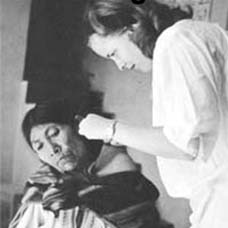
Chip Joseph overcame narcotics and served in the Peace Corps for three years working at a leper colony
Charles "Chip" Joseph's story
At first glance, Chip Joseph, 56, is an anomaly in the Y-Haven setting. White and Jewish, Joseph is a 1966 graduate of Shaker Heights High School. His family was one of the founders of Suburban Temple.
What prompted him to become involved with an inner-city project serving mostly African-American and Hispanic males?
"Service has always been my orientation," replies Joseph, who worked at the Free Clinic in the early 1970s and for 13 years at Catholic Charities prior to his recruitment as Y-Haven's director in 1999. He also served in the Peace Corps for three years working at a leper colony.
While service remains at the core of Joseph's motivation, it goes much deeper. Like the men he inspires, Joseph is also in recovery from alcohol and drug abuse. Recovery teaches service. But for a time, Joseph was diverted from his destiny. Twenty years to be exact.
Children of the 1960s were in search of something, Joseph explains. "They looked outside themselves, not realizing probably that the answer was inside themselves."
Joseph started experimenting with narcotics in high school at age 15. After high school, he attended Cleveland State University for two weeks. Less than a year later, he was expelled from Kent State University for social and academic probation. Then he decided to head west and landed in the Haight-Ashbury district of San Francisco.
"Instead of dabbling with alternative ways of living, I decided to submerge myself in it," says Joseph. "In those days, you begged for food, found out where the party was, and stayed with people getting high."
Following one of those parties, Joseph was arrested with others for possession of marijuana with intent to sell; he served some time.
Joseph returned to Cleveland and tried re-enrolling in college, but that didn't work out. It took him seven years to get his undergraduate degree, working odd jobs and traveling to different countries and states.
During this time, Joseph started using hard drugs. His day job would feed his habit for one-and-a-half days; "dealing," primarily in heroin, supported the rest.
Joseph describes his relationship with his parents and sister during these tumultuous years as non-existent. "When I left as a teenager, I came back to visit, but I never came back to live."
His parents were concerned, he says, but they were also in denial. "Like most parents, they thought, 'It's never your kid.'" (Even in high school, when his parents found something in his pocket, Joseph defended himself by saying he was holding it for another kid. They believed him.)
Recently celebrating 19 years of sobriety, Joseph went on to earn a master's degree in social work from the Mandel School of Applied Social Sciences. In 1997, he earned his juris doctor degree from Cleveland Marshall Law School and was the recipient of the Distinguished Alumni Award in 2004. Making him especially happy, he says, is that both his parents, now deceased, were still alive when he got sober. He describes his relationship with them at the end as "great."
The birth of Joseph's daughter Kristina, a special-needs child who is now 21, helped turn his life around. "I knew at that point I had to do something, but I didn't know that something could be done for someone in my (hopeless) circumstance."
Then several miracles happened, including a call from two men whom Joseph had used drugs with but who were now in recovery. One was Jewish, the other black. The Jewish guy picked Joseph up and drove him to treatment, he recalls.
The 12-step program and Joseph's daughter taught him how to begin to love himself and helped him forge an understanding of God.
Every morning Joseph recites the Shema (Hear, O Israel). Addiction is a disease of self in which we as individuals have a propensity to worship ourselves, explains the divorced Ohio City resident. In reciting the Hebrew prayer, Joseph acknowledges that God is God, and Chip cannot be God.
What would Joseph like his story to communicate to CJN readers? Part of it is letting the community know that there are Jews doing hands-on service. "Jews are always great at the tithing piece, but as far as direct service, they're hurting," says Joseph, quickly adding that there are exceptions, like staffers at Bellefaire. Jews "are always generous with their funds and have good hearts as volunteers, but in my 30 years of social work, you don't see a lot of professional Jews in the field," he laments.










